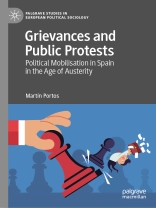This book sheds light on the role that grievances play for mobilisation dynamics in a context of material deprivation. Why do people protest? To what extent do grievances account for the varying size of protest events over time? Covering different levels of analysis, the author argues that effects of socioeconomic aspects (both objective-material deprivation and subjective-attitudinal grievances) are mediated by political attitudes, especially political dissatisfaction. He develops a framework to account for the dynamics, trajectory and timing of the cycle of contention that unfolded in Spain in the shadow of the Great Recession, contributing not only to the field of social movement studies but to our broader understanding of European politics, political sociology, political economy and economic sociology.
Table des matières
Chapter 1. Grievances and protest: an introduction. – Chapter 2. The Great Recession and mobilisation in Spain: the context. – Chapter 3. Taking to the streets in the shadow of austerity: the cycle of contention in Spain, 2007–2015. – Chapter 4. The merrier, the fewer? Political dissatisfaction and protest size fluctuations in times of austerity. – Chapter 5. Unpacking the virtuous circle: aggrieved protesters, feedback effects or both at the same time? – Chapter 6. Voicing political outrage unevenly. – Chapter 7. Podemos: leaving the squares, jumping to the institutions? – Chapter 8. Conclusion: movements of crisis?
A propos de l’auteur
Martín
Portos is Research Fellow at the Scuola Normale Superiore in Florence, Italy. He is the recipient of the Juan J. Linz Best Dissertation Award in Political Science, CEPC (Government of Spain). His work appeared in international peer-reviewed journals including
Acta Politica, American Behavioral Scientist, European Societies, Mobilization and
Regional Studies. He is co-author of
Social Movements and Referendums from Below: Direct Democracy in the Neoliberal Crisis (with D. della Porta, F. O’Connor and A. Subirats Ribas, 2017).












